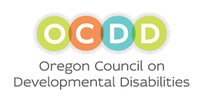 People have asked me about various topics on my Facebook page, but one thing I haven’t discussed is my future and what will happen to me when my parents die. I think many families face this predicament with a lot of fear and anxiety. Let’s be honest – your loved one is worried about that too.
People have asked me about various topics on my Facebook page, but one thing I haven’t discussed is my future and what will happen to me when my parents die. I think many families face this predicament with a lot of fear and anxiety. Let’s be honest – your loved one is worried about that too.
As someone who is unable to speak independently, I am terrified of losing my mother, because she is the main person who uses the letterboard with me. My father is the one who is calm and doesn’t get frustrated with my repeating. There are about a thousand other things that make them irreplaceable, but in my here and now, those are my main gifts from which I draw my energy and understanding of this world. I believe in my heart that if they could, they would live forever out of their love and worry for my future.
Unfortunately, we face lives that are limited by any number of things: the lack of money; school systems that don’t teach from a strengths perspective but use the outdated mindset that disabled students have limited potential and use to society; jobs that are barely available to those of us with greater support needs; inferior support by poorly trained staff who leave within a year for better paying jobs; little options for housing that is affordable or has supports available for real living arrangements, i.e., living with non-disabled roommates or other disabled people, but not in an institution or nursing home; racism, homophobia, ableism, xenophobia, environmental exploitation, conservativism, and religious politicians cementing biases into laws that further limit our ability to live our truest lives.
 One feels rather powerless in the face of all those barriers, and so I give weight and priority to anyone who is disabled and experiences additional forces beyond their diagnosis over any parent or professional who claims to know what is best for a group of disabled people. Logically then, it follows that we should listen to our disabled children when it comes to what they want in the future, and identify the steps that can get them there. Part of this means that parents must try harder to see their children’s potential abilities, of course, which can be daunting when they are little and have to learn many skills. For some reason, many get stuck in their child’s deficits. Whether that’s right or wrong, it seems better to look for possibilities over dead ends because you can always scale back a goal, but if you don’t set one that pushes the limit a little bit, you might sell your child’s dreams short. This means keeping up with the latest news related to their disability, finding people who are knowledgable about issues that come up, and especially people that share that diagnosis. I can’t stress this enough. Time for meeting with and learning from disabled people who can share their experiences will pay for itself many times over, and is exactly the paradigm shift which needs to become the norm to planning one’s future.
One feels rather powerless in the face of all those barriers, and so I give weight and priority to anyone who is disabled and experiences additional forces beyond their diagnosis over any parent or professional who claims to know what is best for a group of disabled people. Logically then, it follows that we should listen to our disabled children when it comes to what they want in the future, and identify the steps that can get them there. Part of this means that parents must try harder to see their children’s potential abilities, of course, which can be daunting when they are little and have to learn many skills. For some reason, many get stuck in their child’s deficits. Whether that’s right or wrong, it seems better to look for possibilities over dead ends because you can always scale back a goal, but if you don’t set one that pushes the limit a little bit, you might sell your child’s dreams short. This means keeping up with the latest news related to their disability, finding people who are knowledgable about issues that come up, and especially people that share that diagnosis. I can’t stress this enough. Time for meeting with and learning from disabled people who can share their experiences will pay for itself many times over, and is exactly the paradigm shift which needs to become the norm to planning one’s future.
An equally important task which must occur is for advocacy to become part of future planning. Maybe your child wants to get married some day, but you’re worried they will lose their SSI benefits. Instead of accepting this unfair reality, do something about it – reach out to legislators and share their story. Every time I hear about some unfair practice that primarily affects disabled people, it is rooted in policies. Well, these can be changed within our society, and we should be energized to improve them, not grumble about how unfair they are. These are our lives, after all, and we deserve to lead them how we choose. Are you likely to make that a reality, or do you want someone else to do that when you’re gone? I hope it’s your life’s work, because it’s highly unlikely anyone else will care as much as you do about their future and what they want for themselves.
